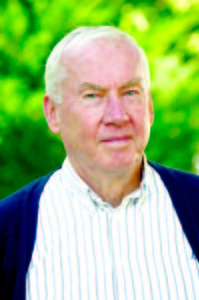Small World: Ode to 8.3 million souls
By Henry Precht
BN Columnist
We spent two weeks in New York City this month, renting an apartment in Brooklyn Heights from a friend of a relation. We had visited the city occasionally, but never longer than passing through for a few days.
For me, the place holds a sort of mythic memory. It’s where a century and a half ago my German grandparents separately landed after emigrating. Very likely they lodged in a cramped apartment building/boarding house like the one we visited in lower Manhattan’s Tenement Museum. Water only from a tap in the backyard, sparse light and heat, too many other newcomers crowding in. Pretty soon, the first Henry Precht was told by his doctor that he had to leave the damp, cold job of churning ice cream in a basement and move to the (damp, hot) south.
Growing up in that then poverty and depression-racked region, I looked up to the “North,†or New York, as a land of advanced people, without exception smarter than my bunch. Until World War II came, most of the people of our town were born there. Then, families with kids began to move in; they were always quicker and better performing in class and on the playground. Of course, they had the arrogance to go with those talents.
During our recent visit, I was able to confirm that initial impression. For 14 days we were baffled by the complexities of the subway and bus systems. Ask — as we did repeatedly — any New Yorker for directions to even the most distant site and without hesitation he or she could spill out the complicated route. Or just stand there hesitating and looking lost and someone was bound to ask if we needed help. The reputation that the city has for abrupt rudeness is a canard; we never experienced even a hint of unpleasant behavior.
Another — apparently — false accusation one hears about the city is that its residents are by nature dishonest. If they don’t cheat you, they will mug and rob you. While we didn’t venture into the darkest zones of iniquity, we never were short changed, never felt threatened by anyone on the streets — as seemingly safe as Bridgton.
Normally, when we have made a trip in the fall, we have journeyed to a city overseas where we had lived during my Foreign Service career. Throughout our New York stay I had the distinct impression that we were in a foreign land. Not just because so many languages were spoken on the streets, but behaviors were sometimes bizarre (or different from what we had known elsewhere). Like the lady delivering a sermon or religious rant, standing in the front of the bus and addressing the riders. Most tried to ignore her, but others engaged her in an active dialogue. Or the young fellow who turned on his tape recorder in a long stretch of an express subway ride without stops and performed a break dance to an enthusiastic audience. Or at least that was what I imagined it was; I could only see his feet bobbing over the heads of his standing, cheering audience.
Further testimony to the superiority of New York were three things: The opulence of holdings in its museums — surely not surpassed anywhere in the world — and the excellence of its eateries. We stayed over an Italian restaurant — the equal of what we knew in Rome — without a sign over the door but every evening packed with a hungry crowd. Or the Indian restaurant a few doors down with a rich menu of unfamiliar tastes — at half price for lunch.
Finally, there is the theater to be praised. Only perhaps in London are to be seen such a variety of classic and new pieces on offer. We chose a bridge between the two cities: an imported version of Julius Caesar performed by an all-female cast of jailbirds with the audience treated as if in prison too. Never have I seen such an electric, expertly executed drama.
Who knows? If grandpa hadn’t gotten the chills in that slum basement, I might have known those delights all my life.
Henry Precht is a retired Foreign Service Officer.


